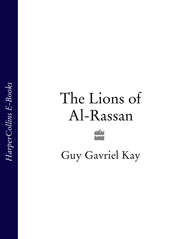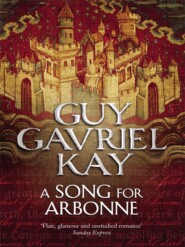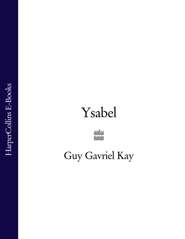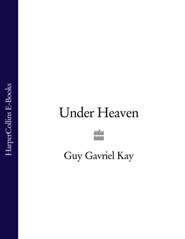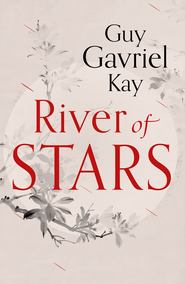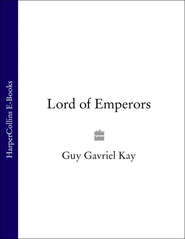По всем вопросам обращайтесь на: info@litportal.ru
(©) 2003-2025.
✖
Tigana
Автор
Год написания книги
2018
Настройки чтения
Размер шрифта
Высота строк
Поля
Baerd’s teeth flashed briefly in the moonlight. ‘I would have stopped you in any case.’
Alessan swore succinctly. Then, a moment later, relaxed into quiet amusement. The two men had a manner with each other that spoke to long familiarity. Catriana, Devin saw, had not smiled. Certainly not at him. On the other hand, he reminded himself, he was supposed to be the one who was angry. The present circumstances made it a little hard though. He felt anxious and proud and excited, all at once.
He was also the only one of the four of them who hadn’t noticed Tomasso, bound at wrist and ankle to his horse.
‘We’d better check the lodge,’ Baerd said as the transient mood slipped away. ‘Then I think we will have to travel very fast. Sandre’s son will name you and the boy.’
‘We had better have a talk about the boy first,’ Catriana said in a tone that made it suddenly very easy for Devin to reclaim his anger.
‘The boy?’ he repeated, raising his eyebrows. ‘I think you have evidence to the contrary.’ He let his gaze rest coldly on hers, and was rewarded to see her flush and turn away.
Briefly rewarded.
‘Unworthy, Devin,’ Alessan said. ‘I hope not to hear that note from you again. Catriana violated all I know of her nature in doing what she did this morning. If you are intelligent enough to have come here you will be more than intelligent enough to now understand why she did it. You might suspend your own pride long enough to think about how she is feeling.’
It was mildly said, but Devin felt as if he had just been punched in the stomach. Swallowing awkwardly, he looked from Alessan back to Catriana, but her gaze was fixed on the stars, away from and above them all. Finally, shamed, he looked down at the darkened forest floor. He felt fourteen years old again.
‘I don’t particularly appreciate that, Alessan,’ he heard Catriana saying coldly. ‘I fight my own wars. You know it.’
‘Not to mention,’ Baerd added casually, ‘the dazzling inappropriateness of your chastising anyone alive for having too much pride.’
Alessan chose to ignore that. To Catriana he said, ‘Bright star of Eanna, do you think I don’t know how you can fight? This is different though. What happened this morning cannot be allowed to matter. I can’t have this becoming a battle between you if Devin is to be one of us.’
‘If he what?’ Catriana wheeled on him. ‘Are you mad? Is it the music? Because he can sing? Why should someone from Asoli possibly be—’
‘Hold peace!’ Alessan said sharply. Catriana fell abruptly silent.
Not having any good idea where to look or what to feel, Devin continued to simulate an intense interest in the loamy forest soil beneath his feet. His mind and heart were whirling with confusion.
Alessan’s voice was gentler when he resumed. ‘Catriana, what happened this morning was not his fault either. You are not to blame him. You did what you felt you had to do and it did not succeed. He cannot be blamed or cursed for following you as innocently as he did. If you must, curse me for not stopping him as he went through the door. I could have.’
‘Why didn’t you then?’ Baerd asked.
Devin remembered Alessan looking at him as he’d paused in the archway of that inner door that had seemed a gateway to a land of dreaming.
‘Yes, why?’ he asked awkwardly, looking up. ‘Why did you let me follow?’
The moonlight was purely blue now. Vidomni was over west behind the tops of the trees. Only Ilarion was overhead among the stars, making the night strange with her shining. Ghostlight, the country folk called it when the blue moon rode alone.
Alessan had the light behind him so his eyes were hidden. For a moment the only sounds were the night noises of the forest: rustle of leaf in breeze, of grass, the dry crackle of the woodland floor, quick flap of wings to a branch near by. Somewhere north of them a small animal cried out and another answered it.
Alessan said: ‘Because I knew the tune his father taught him as a child and I know who his father is and he isn’t from Asoli. Catriana, my dear, it isn’t just the music, whatever you may think of my own weaknesses. He is one of us, my darling. Baerd, will you test him?’
On the most conscious, rational level, Devin understood almost none of this. None the less he felt himself beginning to grow cold even as Alessan spoke. He had a swooping sense, like the descent of a hunting bird, that he had come to where Morian’s portal had led him, here in the shadows of this wood under the waxing blue moon.
Nor was he made easier when he turned to Baerd and saw the stricken look on the face of the other man. Even by the distorting moonlight he could see how pale Baerd had become.
‘Alessan . . .’ Baerd began, his voice roughened.
‘You are dearer to me than anyone alive,’ Alessan said, calm and grave. ‘You have been more than a brother to me. I would not hurt you for the world, and especially not in this. Never in this. I would not ask unless I was sure. Test him, Baerd.’
Still Baerd hesitated, which made Devin’s own anxiety grow; he understood less and less of what was happening. Only that it seemed to matter to the others, a great deal.
For a long moment no one moved. Finally Baerd, walking carefully, as if holding tightly to control of himself, took Devin by the arm and led him a dozen steps further into the wood to a small clearing among a circle of trees.
Neatly he lowered himself to sit cross-legged on the ground. After a moment’s hesitation Devin did the same. There was nothing he could do but follow the leads he was being given; he had no idea where they were going. Not on the road I’m on, he remembered Catriana saying in the palace that morning. He linked his hands together to keep them steady; he felt cold, and it had little to do with the chill of night.
He heard Alessan and Catriana following them but he didn’t look back. For the moment what was important was the enormous thing—whatever it was—that he could see building in Baerd’s eyes. The blond-haired man had appeared so effortlessly competent until this moment and now, absurdly, he seemed to have become terribly fragile. Someone who could be shattered with unsettling ease. Abruptly, and for the second time in that long day, Devin felt as if he were crossing over into a country of dream, leaving behind the simple, defined boundaries of the daylight world.
And in this mood, under the blue light of Ilarion, he heard Baerd begin the tale, so that it came to him that first time like a spell, something woven in words out of the lost spaces of his childhood. Which is what, in the end, it was.
‘In the year Alberico took Astibar,’ said Baerd, ‘while the provinces of Tregea and Certando were each preparing to fight him alone, and before Ferraut had fallen, Brandin, King of Ygrath, came to this peninsula from the west. He sailed his fleet into the Great Harbour of Chiara and he took the Island. He took it easily, for the Grand Duke killed himself, seeing how many ships had come from Ygrath. This much I suspect that you know.’
His voice was low. Devin found himself leaning forward, straining to hear. A trialla was singing sweetly, sadly, from a branch behind him. Alessan and Catriana made no sound at all. Baerd went on.
‘In that year the Peninsula of the Palm became a battleground in an enormous balancing game between Ygrath and the Empire of Barbadior. Neither thought it could afford to give the other free rein here, halfway between the two of them. Which is one of the reasons Brandin came. The other reason, as we learned afterwards, had to do with his younger, most-beloved son, Stevan. Brandin of Ygrath sought to carve out a second realm for his child to rule. What he found was something else.’
The trialla was still singing. Baerd paused to listen, as if finding in its liquescent voice, gentler even than the nightingale’s, an echo to something in his own.
‘The Chiarans, attempting to rally a resistance in the mountains, were massacred on the slopes of Sangarios. Brandin took Asoli province soon after, and word of his power ran before him. He was very strong in his sorcery, even stronger than Alberico, and though he had fewer soldiers than the Barbadians in the east, his were more completely loyal and better trained. For where Alberico was only a wealthy, ambitious minor lord of the Empire using hired mercenaries, Brandin ruled Ygrath and his were the picked soldiers of that realm. They moved south through Corte almost effortlessly, defeating each province’s army one by one, for none of us acted together in that year. Or after, naturally.’ Baerd’s voice wasn’t quite detached enough for the irony he was trying for.
‘From Corte, Brandin himself turned east with the smaller part of his army to meet Alberico in Ferraut and pin him down there. He sent Stevan south to take the last free province in the west and then cross over to join him in Ferraut to meet the Barbadians in the battle that I think they all expected would shape the fate of the Palm.
‘It was a mistake, though he could not really have known it then, eighteen years ago. Newly landed here, ignorant of the natures of the different provinces in this peninsula. I suppose he wanted Stevan to have a taste of leadership on his own. He gave him most of the army and his best commanders, relying on his own sorcery to hold Alberico until the others joined him.’
Baerd paused for a moment, his blue eyes focused inward. When he resumed, there was a new timbre to his voice; it seemed to Devin to be carrying many different things, all of them old, and all of them sorrowful.
‘At the line of the River Deisa,’ Baerd said, ‘a little more than halfway between Certando and the sea at Corte, Stevan was met by the bitterest resistance either of the invading armies was to find in the Palm. Led by their Prince—for in their pride they had always named their ruler so—the people of that last province in the west met the Ygrathens and held them, and beat them back from the river with heavy losses on both sides.
‘And Prince Valentin of that province . . . the province you know as Lower Corte, slew Stevan of Ygrath, Brandin’s beloved son, on the bank of the river at sunset after a bitter day of death.’
Devin could almost taste the keenness of old grief in the words. He saw Baerd glance over for the first time to where Alessan was standing. Neither man spoke. Devin never took his own eyes away from Baerd. He concentrated as if his life depended on his doing so, treating each word spoken as if it were a jewelled mosaic piece to be set into the memory that was his own pride.
And right about then it seemed to Devin that a distant bell began to toll in some recess of his mind. Ringing a warning. As might a village bell in a temple of Adaon, summoning farmers urgently back from the fields. A far bell heard, faint but clear, from over morning fields of waving yellow grain.
‘Brandin knew what had happened immediately through his sorcery,’ Baerd said, his voice like the rasp of a file. ‘He swept back south and west, leaving Alberico a free hand in Ferraut and Certando. He came down with the full weight of his sorcery and his army and with the rage of a father whose son has been slain, and he met the remnant of his last foes where they had waited for him by the Deisa.’
Once more Baerd looked over at Alessan. His face was bleak, ghostly in the moonlight. He said:
‘Brandin annihilated them. He smashed them to pieces without mercy or respite. Drove them helplessly before him back into their own country south of the Deisa and he burned every field and village through which he passed. He took no prisoners. He had women slain in that first march, and children, which was not a thing he’d done anywhere else. But nowhere else had his own child died. So many souls crossed over to Morian for the sake of the soul of Stevan of Ygrath. His father overran that province in blood and fire. Before the summer was out he had levelled all the glorious towers of the city in the foothills of the mountains— the one now called Stevanien. On the coast he smashed to rubble and sand the walls and the harbour barriers of the royal city by the sea. And in the battle by the river he took the Prince who had slain his son and later that year had him tortured and mutilated and killed in Chiara.’
Baerd’s voice was a dry whisper now under the starlight and the light of the single moon. And with it there was still that bell warning of sorrows yet to come, tolling in Devin’s mind, louder now. Baerd said:
‘Brandin of Ygrath did something more than all of this. He gathered his magic, the sorcerous power that he had, and he laid down a spell upon that land such as had never even been conceived before. And with that spell he . . . tore its name away. He stripped that name utterly from the minds of every man and woman who had not been born in that province. It was his deepest curse, his ultimate revenge. He made it as if we had never been. Our deeds, our history, our very name. And then he called us Lower Corte, after the bitterest of our ancient enemies among the provinces.’
Behind him now Devin heard a sound and realized that Catriana was weeping. Baerd said, ‘Brandin made it come to pass that no one living could hear and then remember the name of that land, or of its royal city by the sea or even of that high, golden place of towers on the old road from the mountains. He broke us and he ravaged us. He killed a generation, and then he stripped away our name.’
And those last words were not whispered or rasped into the autumn dark of Astibar. They were hurled forth as a denunciation, an indictment, to the trees and the night and stars—the stars that had watched this thing come to pass.






